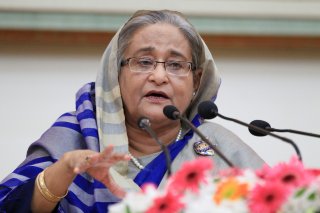
The escalating superpower competition between the United States and the People’s Republic of China (PRC) has gone from a trade dispute to a rivalry over the future of world order, technology, and values. Despite both sides being open to dialogue, President Joe Biden has made it clear that the United States will continue to compete vigorously with the PRC, aligning efforts with allies and partners around the world, and creating coalitions with like-minded countries on tech, intelligence, and strategy to counter Beijing.
Many poor countries in the Global South do not want to be caught in the middle of this competition; they want to improve their livelihood and develop their economies. China offers an easy solution via its now infamous “debt trap diplomacy,” where it provides massive loans without pre-conditions on issues of democracy or human rights, unlike the United States. Such loans enable China to influence these countries.
To counteract this, the United States established several coalitions with its partners, such as the AUKUS and the Quad. Creating these coalitions did not go smoothly, and it would be even more challenging to do similar with countries in the Global South. Nevertheless, Washington needs to adjust its strategy to expand its coalitions further. Bangladesh, a natural partner in the Indo-Pacific region, could be an excellent starting point.
Why Bangladesh?
Bangladesh has made remarkable economic progress in recent years, embracing various liberal economic policies under the guidance and support of Western financial institutions such as the Asian Development Bank and the IMF. Bangladesh did take loans from China, but these only account for 8 percent of its foreign debt—unlike its neighbors Sri Lanka and Pakistan, which took on far more. Moreoever, Japan, a strategic U.S. partner, is the leading contributor of aid to Bangladesh.
Politically, Bangladesh has a special relationship with India. Despite efforts made by Sheikh Hasina’s government to normalize relations with Pakistan, Indian-Bangladeshi relations remain solid, which the United States can leverage to keep China at bay. As a Muslim-majority country, Bangladesh can project its principle of “friendship to all, malice to none” not only within the Indo-Pacific but also to the Middle East, creating a bridge between Asia and the Middle East.
Although Bangladesh aims to remain geopolitically neutral, it is very much involved in global politics—though not always by choice. Following the Rohingya crisis in neighboring Myanmar, Bangladesh opened its borders and gave shelter to around one million refugees, who are still living in camps dependent on international aid, almost six years after fleeing their homes. In addition, Bangladesh has participated in peacekeeping operations all over the world, being the leading contributor to peacekeeping officers with more than 7,000 personnel.
But can the United States really bring Bangladesh to engage more with its camp?
There are indicators that such may be possible. For instance, in the past, Washington’s close relations with Pakistan had a cooling effect on Bangladesh. However, with America’s withdrawal from Afghanistan, its warming relations with India, and its increasing focus on countering China, the conditions are set for a better alignment between American interests and those of Bangladesh.
Moreover, in the last two months, Bangladesh has experienced firsthand what new the superpower competition looks like. In January, Bangladesh hosted two delegations from China, one led by Chinese foreign minister Qin Gang and another high-level delegation led by a senior Chinese official. This Chinese charm offensive was immediately answered by the United States: in January, the U.S. Assistant Secretary of State, Donald Lu, visited Bangladesh, and in February, an official delegation led by Derek Chollet, held discussions with Hasina on the Rohingya and the Indo-Pacific, among other topics.
But if the United States wants to establish an advantage over China, then a game-changer move is needed. There is an open invitation for Biden to visit Bangladesh, made by Hasina at the last UN General Assembly. President Biden should accept the invitation. Such a visit could not only help provide assurances for protecting democracy and progress in Bangladesh, but could also help position Bangladesh as a valuable partner in the Indo-Pacific region.
No comments:
Post a Comment